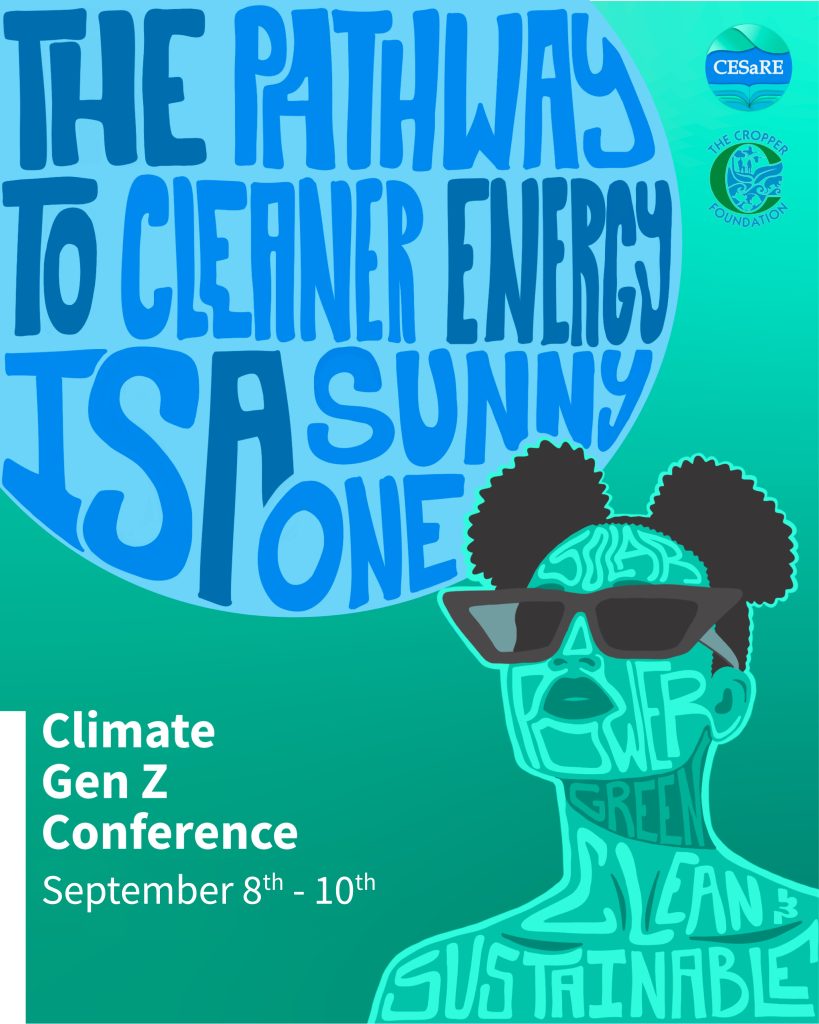A FREE Virtual Climate Conference for the Caribbean’s Generation Z

The Caribbean will see its first climate conference catering to some of the region’s youngest advocates and leaders hosted in September 2023.
The first Climate Gen Z Conference, a virtual gathering for youth aged 16 to 24 years from across the Caribbean, will take place online over three days, September 8-10. Current, up-and-coming, and aspiring climate activists and influencers will have the opportunity to improve their communication and branding around their passions while delving into the complexities of climate change science, policy, politics, and climate justice.
A non-profit initiative led by the Journal of CESaRE (Caribbean Environmental Sciences and Renewable Energy) in partnership with The Cropper Foundation, this virtual conference aims to improve and expand activism on climate change issues facing the Caribbean through engaging, practical, and skills-based sessions.
In addition to promoting sustainable, intra-regional, engaged Gen Z-led activism as a critical component of climate justice, organisers will connect Gen Z activists with regional resources and institutions to support their advocacy, as well as highlight the importance of safeguarding mental and physical health in the process.
The conference is free to all participants and will comprise a mix of public events (keynote sessions) and workshops (small group sessions) featuring invited professionals, organizations, and fellow youth influencers with sound knowledge and experience in the climate space.
Kicking off the weekend-long programme with her opening keynote address titled “Believe in Your Journey” is St. Lucian Dr Len Ishmael – geopolitics expert, global strategist, professor, and author. Among Dr Ishmael’s many achievements, she has served as Director for the United Nations Economic Commission for Latin America & the Caribbean (UNECLAC), Director General for the Organization of Eastern Caribbean States (OECS) and Alternate Governor for the World Bank. Currently, she is the Special Advisor (Europe) to the Vice Chancellor of the University of the West Indies.
Why Gen Z?
Climate change has also sparked debates on intergenerational justice, as its impact increases the risk that younger people will not be able to meet their basic needs in the future. The issue has inspired action by Generation Z (Gen Z) – those born in the late 1990s and early 2000s – who have become key voices in the climate change discourse.
Although generational boundaries can be arbitrary, it is believed that Generation Z is marked by differences from previous generations, and, by climate change concerns and an awareness of the existential crisis and its impact on their ability to lead safe and stable lives.
Recent research has indicated that, in their role in climate activism, members of Generation Z feel isolated and ignored in the climate change conversation and like they are being ‘left to save the world’ without support from the persons who currently have decision-making power. They also want to become more politically and publicly active but do not know how and yearn for real opportunities to be climate leaders and help drive change from where they are.
“We ask a lot from our youngest generations, often relying on them to clean up our mess” says Masao Ashtine, conference convener and Journal of CESaRE co-founder. “We constantly hear, ‘It is so great to see a strong youth representation’, yet we give them sessions on the last day of the conference or minimise their speaking times.”
Ashtine continues, “We’ve created the Climate Gen Z Conference as a platform for them to enter with passion but leave fortified in their action. We could simply describe it as an extensive (but fun) capacity-building exercise, which we know is vital to building the credibility of any movement. We see this conference as one of many collective efforts to harness Caribbean activism and tap into the surplus of Caribbean talent.”
The Climate Gen Z Conference is supported by the Open Society Foundations, the Inter-American Development Bank, and CANARI.
For registration information, follow the Journal of CESaRE and The Cropper Foundation on all social media platforms or email inquiries@cesarejournal.org or outreach@thecropperfoundation.org.





